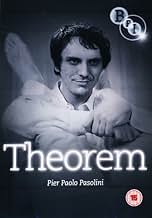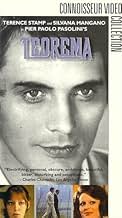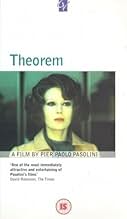Un joven misterioso seduce a cada miembro de una familia burguesa. Cuando se vaya de repente, ¿cómo cambiarán sus vidas?Un joven misterioso seduce a cada miembro de una familia burguesa. Cuando se vaya de repente, ¿cómo cambiarán sus vidas?Un joven misterioso seduce a cada miembro de una familia burguesa. Cuando se vaya de repente, ¿cómo cambiarán sus vidas?
- Premios
- 1 premio y 5 nominaciones en total
- Second Boy
- (as Ivan Scratuglia)
- Interviewer
- (sin acreditar)
- Old Peasant
- (sin acreditar)
Argumento
¿Sabías que...?
- CuriosidadesAt the 1968 Venice Film Festival, the film was given an award by the International Catholic Film Office. The award was withdrawn after critical remarks by Pope Paul VI. After the festival the film was confiscated by Italian police and Pier Paolo Pasolini charged with obscenity, but acquitted.
- PifiasAfter literally rolling around in a ditch with some kid she picked up on the street, the mother's designer suit remains clean and pressed.
- Citas
Lucia, the mother: I realize now that I've never had any real interest in anything. I don't mean anything grand. Just the simple, everyday interest my husband takes in his work, or my son in his studies, or Odetta in family life. I've had nothing like that. I don't know how I lived with such emptiness, yet I did. If there was anything at all, some instinctive love of life, it has withering away - like a garden where no one ever goes. Actually, that void was filled with false and wretched values, an appalling jumble of misguided ideas. Now I see: You filled my life with a real and total interest. So by leaving, you're not destroying anything that was there before, except my chaste bourgeois reputation. Who cares about that?
- ConexionesEdited into Histoire(s) du cinéma: Seul le cinéma (1994)
- Banda sonoraRequiem
KV 626
Written by Wolfgang Amadeus Mozart
Performed by Russian Academy Choir and Moscow Philharmonic Orchestra
Courtesy of MK Records
Yes, there is a fable here, a mysterious man upsets balances in a bourgeois household. Yes, it is from those times -Bunueltimes, Godardtimes- when the word 'bourgeois' was meant quite vehemently. It is symbolically abstruse throughout about empty lives and the quest for meaning.
But, I think as with these people depicted on desperate journeys to fulfillment, the more you cling to the search for meaning as a viewer and try to boil it down to something that makes sense, the more you end up with just an allegory about the failure to do it. For all I know, that was Pasolini's intention, echoed loudly in the parting cry for god in the wilderness.
No matter. Me and him mean wholly different things by emptiness. What captivates me here is the free form of the narrative, the cinematic eye that places you as transparent observer in the same world as these people, not easy to accomplish this at all, and the journey through cracks of story to the wondrous emptiness of everything (trees, sunlight, concrete, people) languidly floating in space together.
It is in the same direction as Antonioni, though hampered by allegory. It invigorates the senses like he does. And the eye is tuned to the same architecture of empty space as seen in L'Eclisse and Blowup.
Pasolini may have meant this as lament or indictment. I get the same melancholy joy as from Japanese woodblocks.
- chaos-rampant
- 17 nov 2012
- Enlace permanente
Selecciones populares
- How long is Teorema?Con tecnología de Alexa
Detalles
- Duración1 hora 38 minutos
- Color
- Relación de aspecto
- 1.85 : 1
Contribuir a esta página



































